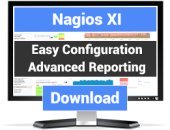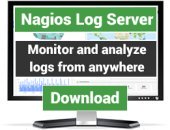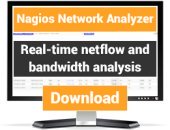Search Exchange
Search All Sites
Nagios Live Webinars
Let our experts show you how Nagios can help your organization.Login
Directory Tree
check_lxc_resources
Current Version
1.0
Last Release Date
2014-08-24
Compatible With
- Nagios 3.x
- Nagios 4.x
Owner
License
GPL
Hits
19423
Usage
Usage : check_lxc_resources -h -n -w -c [-d]
-h : set container name
-n : set container namespace to check (memory|swap)
-w : set warning percent alert
-c : set critical percent alert
-d : debug mode
-help : print this message
Output will looks like this for memory:
memory usage is 42.95% (219M/512M) / 292M free / 177M cached
And like this for swap:
swap usage is 0.02% (0M/464M) / 463M free
Configuration
To make it work, you have to define this command:
define command {
command_name check_lxc_resources
command_line /usr/lib/nagios/plugins/check_nrpe -H $_HOSTPARENT$ -c check_lxc_resources -a $HOSTALIAS$ $ARG2$ $ARG3$ $ARG4$
}
$_HOSTPARENT$: this can be a defined macro to indicate the parent host (which is the host machine)
You can use hostgroups templating:
define hostgroup {
hostgroup_name lxc
alias lxc containers
}
define service{
use generic-service
hostgroup_name lxc
service_description Memory usage
check_command check_lxc_resources!''!'memory'!90!95
}
define service{
use generic-service
hostgroup_name lxc
service_description SWAP usage
check_command check_lxc_resources!''!'swap'!2!5
}
And then you can declare to your hosts:
define host{
use generic-host,host-pnp
host_name hostname.domain.com
alias hostname
address hostname.domain.com
hostgroups lxc
_PARENT parenthost.domain.com
}
Usage : check_lxc_resources -h
-h : set container name
-n : set container namespace to check (memory|swap)
-w : set warning percent alert
-c : set critical percent alert
-d : debug mode
-help : print this message
Output will looks like this for memory:
memory usage is 42.95% (219M/512M) / 292M free / 177M cached
And like this for swap:
swap usage is 0.02% (0M/464M) / 463M free
Configuration
To make it work, you have to define this command:
define command {
command_name check_lxc_resources
command_line /usr/lib/nagios/plugins/check_nrpe -H $_HOSTPARENT$ -c check_lxc_resources -a $HOSTALIAS$ $ARG2$ $ARG3$ $ARG4$
}
$_HOSTPARENT$: this can be a defined macro to indicate the parent host (which is the host machine)
You can use hostgroups templating:
define hostgroup {
hostgroup_name lxc
alias lxc containers
}
define service{
use generic-service
hostgroup_name lxc
service_description Memory usage
check_command check_lxc_resources!''!'memory'!90!95
}
define service{
use generic-service
hostgroup_name lxc
service_description SWAP usage
check_command check_lxc_resources!''!'swap'!2!5
}
And then you can declare to your hosts:
define host{
use generic-host,host-pnp
host_name hostname.domain.com
alias hostname
address hostname.domain.com
hostgroups lxc
_PARENT parenthost.domain.com
}
Reviews (0)
Be the first to review this listing!


 New Listings
New Listings

